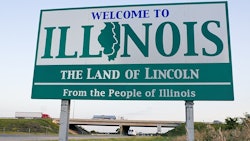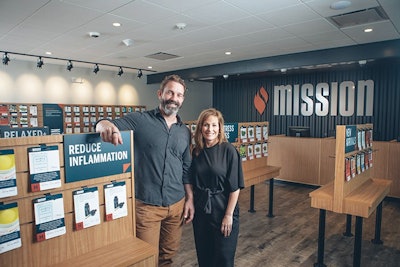
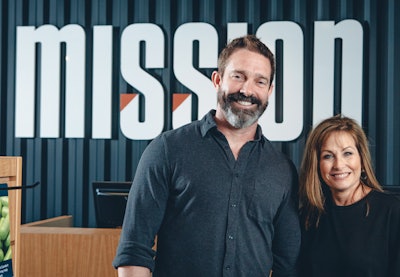
In his role as managing partner of Revolution Brands, a food branding company, Glenn Backus’ job was to—as the company’s name may suggest—revolutionize everyday products. He helped develop an instant, single-serve form of steel-cut oatmeal, Rambling Oat Co., and an alternative to sugary drinks for children, Protein Kids Super Juice. Backus says he’s taking a similar approach to innovation as the president of Mission, a Chicago-based, multistate dispensary company.
Backus, who stepped down as managing partner but continues to serve as co-owner of the brand-development agency, became president of Mission dispensaries in January. While Backus is new to the cannabis industry, he sees similarities to his previous roles in the food and beverage sector. “I’ve had the ability to incrementally improve the lives of millions of people across the country every day, whether in my path through healthier food, or better or more convenient options, and now it's on the cannabis side,” he says.
For example, Backus already is working to improve product visibility and information for consumers: Mission is reducing the number of SKUs from several hundred to about 100 in each of its nine branded stores—located in Illinois, Maryland, Massachusetts, Pennsylvania and Arizona (parent company 4Front Ventures, which recently merged with Cannex, is based in Phoenix)—to ensure it’s only providing products that patients want, Backus says.
It’s all part of a companywide focus on providing an exceptional customer experience.
Service-Focused
To give patients “truly world-class customer service,” Mission created a chief experience officer position for Leah Heise, who also oversees compliance for Mission. The title is common in other industries, but it’s relatively new in the cannabis space, Heise says. “The job description covers everything from the experience of the patient to the employee. … We really believe that our employees cannot service our patients to the best of their abilities if they are not happy in their workplace.”
Heise defines the Mission experience as “being the best place for inspiring cannabis consumers” and notes that training the dispensaries’ patient or cannabis consultants (their preferred titles for budtenders) and other personnel plays a huge part in ensuring customers leave informed, not confused.
A weeklong training program, developed in-house, addresses not only the consultants’ cannabis knowledge, but a more “human element,” too, Heise says, which is important because most of Mission’s dispensaries operate in medical-only states. 4Front began as a consulting business that assisted clients in securing operating licenses, and part of that work included building training modules, developing best practices and standard operating procedures (SOPs).
Education continues beyond the first week, as sessions about how cannabis affects the body and other topics are offered throughout the year. But Heise says empathy begins with hiring the right people.
Consultants “are in a situation where [they] are dealing with pain on a daily basis. … Treating those patients is very different than treating a regular retail customer,” Heise says. “They have a heavy lift. They are the front line. They are caregivers. They are the heart and soul of Mission.”
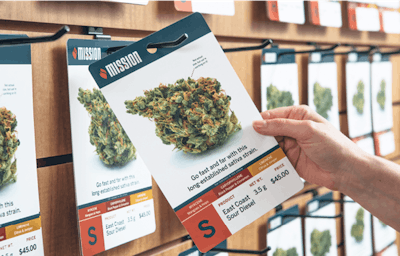
Heise has worked in the cannabis market for about four years, building a legal practice around medical compliance and licensing after a career as an enforcement attorney with the National Oceanic and Atmospheric Administration. In 2001, Heise was diagnosed with chronic pancreatitis, for which no cure exists. Doctors did not expect her to survive past five years, and they prescribed her a cocktail of pain medications to manage the condition. It wasn’t until 2013 that a physician suggested she investigate cannabis for her pain and inflammation, and after learning about the possibilities, she became a legal expert and an advocate.
“Having struggled with a potentially fatal, chronic illness for 20 years, I know what it is like to feel alone, isolated and misunderstood,” Heise says. “Never having one of our customers feel that way (whether as a patient or retail purchaser) is a primary motivator for me at Mission.”
Being a place where patients can get answers from people is important to Mission. The company operates a hotline that customers and non-customers can call for cannabis information, and associates receive the same training as in-store staff. “We have people [across] the country who answer the phone if you're calling and you're worried about what your strain alignment is, if you want to know how to get a card in your state, or you need help navigating that process,” Heise says. The hotline gets an average of 800 calls a week, and Heise calls it “a way to provide one more level of service ... and an integral part of the Mission experience.” Many calls are from people who simply want to know if they’re eligible for a medical card, Heise says. “If someone calls about a particular condition, they will research studies and what the best strain alignment might be. Then, they will send those studies to [the caller].”
Once customers leave, the company stays in touch through emails and text messages. “In the Mission world, the thing that I am most proud of is the level of empathy and care that our associates give to our patients and our customers, and the responses that we get from folks,” Backus says. “We have people come in with positive feedback about our staff going above and beyond to help them when no one else would or they didn't know where to go.”
Backus says both customer counts and retention have increased (where they can measure those metrics) since implementing some of their latest initiatives, but did not provide specific figures.
Information and Inspiration
One area Mission is working on is how dispensary customers navigate products they’re interested in and obtain information. “One of the things I find interesting in this business—which just comes from having talked to employees, as well as customers—is that most of the cannabis dispensaries today are not merchandised in a way that is easy to shop,” Backus says.
In many dispensaries, product information is displayed on a single menu or screen, which customers can read as they stand in line to order. But “you've kind of got the pressure of a line … building up behind you,” Backus says, “and now you've got to make a decision.” That pressure isn’t conducive to helping patients find products to solve their problems—or even for adult users to figure out whether an edible or a flower will help them best achieve the result they want, he says.
So, in Mission’s Massachusetts and Rockville, Md., locations, the dispensaries have rolled out another option —product information cards that patients can pick up and read. Each card includes the brand name and its relevant information, from its cannabinoid profile to why Mission loves the product. People still can talk with Mission staff or walk up to the registers, but this new addition allows people to actually shop, Backus explains.
“Having struggled with a potentially fatal, chronic illness for 20 years, I know what it is like to feel alone, isolated and misunderstood. Never having one of our customers feel that way … is a primary motivator for me at mission.” Leah Heise, chief experience officer, Mission
Backus says it’s too early to tell how this new shopping experience is affecting wait times and sales, but a goal is to increase throughput.
“You can browse our entire assortment in a visual display that's also physical,” Backus says. “You can pull the card off of the peg, hold it in your hand, go up and pay for it—just like you would for any other retail transaction. ... People are used to shopping, and when you go into any other retail environment, you generally can pick up the item, hold it, take a look at it, get what information you need about it, and make a good decision for yourself,” he continues. “In the cannabis world, because of the regulations, there are very few places … that we can have the product on the floor out there for customers to touch and hold. We just can't do it.”
If this new system of shopping proves to be effective, Backus says, it will eventually be rolled out to all Mission locations.
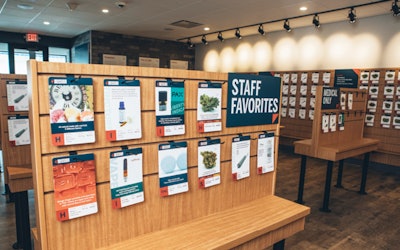
Consistency With a Local Flair
With nearly a dozen dispensaries across six states—the company recently acquired, pending regulatory approval, Om of Medicine in Ann Arbor, Mich., and another Maryland location will come online soon—keeping the brand consistent presents challenges. But Backus says a standardized training program unifies the customer experience across all locations, while Mission’s branding elements—black hues and wood accents, with glass product-display cases—give the dispensaries a similar look. That said, Mission likes to give its dispensaries a little local flair. “If I put a blindfold on everybody and teleported [them] to a Mission dispensary, no matter where it was, you would take the blindfold off and you'd go, ‘I ... know I'm in a Mission dispensary, but I think I am in the Northeast,’” he says.
In its Georgetown, Mass., location, for example, the dispensary has a 6-foot-tall squeezable cannabis bud that staff dubbed a “hug-a-nug.” As Backus explains, “It’s a fun little tribute to what we do, and people can take pictures with it, have fun with it. Nug is something that the staff is getting rallied around. In fact, we're going to have a couple of products that will be Hug-a-Nug branded products, because we think it will be kind of fun.”
In its Rockville, Md., location, which sits in a neighborhood known locally as Mechanicsville, the staff is designing interlocking gears, which will move and turn in slow motion, to display throughout the dispensary—a nod to the area’s history, Backus says.
“It serves two purposes,” Backus says. “[First], it grounds it to the location that it's in. Second, … with all of the energy and color and movement ... that happens inside the stores, this is a cool, chill environmental factor. People could … look up and for a moment, … pause and have 10 seconds of zen. That’s the idea behind it. That's the goal. We're working on what that looks like in each one of the stores.”












